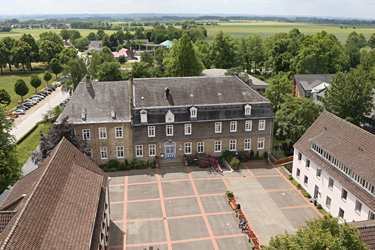E2 - Agriculture and consulting in Hellweg region – Intensive production in compliance with environmental protection and animal welfare

Description of the region
The Hellweg region is mainly situated in Soest district and has been shaped by agriculture for a long time. Besides intensive farming on predominantly fertile soils, farmlands have been optimized for pig fattening in particular, as well as for poultry farming. Many companies had drawn benefits from the regulations of the German law on renewable energies giving them the opportunity to invest into wind, solar and biomass energy. The importance of local farming in the Hellweg region is also stressed by the location of the experimental and educational site “Haus Düsse“ in Bad Sassendorf, Soest district (www.duesse.de).
Just like in any other region, social demands and legal regulations have had a huge and increasing impact on farmers in Hellweg region. During our excursion to “Haus Düsse“, we will get to know two intensively producing farm businesses and their agricultural experiments. Here, we will find out how farming procedures and consulting intend to master the new challenges.
Cultivation, pig farming and bio mass energies in context of mixed farms
The company Rotgeri/Lehmenkühler GbR is situated in a bird sanctuary within the city of Geseke, Soest district. For 25 years, it has been running a mixed farm, including an agricultural business that cultivates a total surface of 175 hectares. It also houses 240 breeding sows and a plant for pig fattening. The 440 kW biogas facility represents another business unit of this company. Rotgeri/Lehmenkühler GbR is going to build further barns for another 550 sows. The managing directors have always focused on green, intergenerational and sustainable methods of cultivation with strong neighbourhood relations. As this company assumes both professional and voluntary responsibilities, social debates about animal welfare and environmental protection are taken seriously. Among other projects, Rotgeri/Lehmenkühler GbR serves as pilot company for biodiversity and participates in a research programme on tailbiting. Such projects help to increase the social awareness, without neglecting the economic viability of the entire company.
Issues of research and counselling for animal welfare and environmental protection
The team of “Haus Düsse“ deals with different issues of research in animal welfare, cultivation and pig and poultry farming. Additionally, it will host several seminars and training courses in cattle farming.
The excursion gives the opportunity to visit the current testing and exposition areas at “Haus Düsse“ and to discuss with local experts. The visits will be organized in groups of approximately 15 people and include the following areas:
- Cultivation of farmland
- Sow farming and ecologically sustainable pig farming
- Cattle farming
Cultivation of farmland and facilities for laying hens
The company Sörries Trockels cultivates 250 hectares of farmland in the south of Soest. It also keeps about 100,000 laying hens and packages the eggs on-site. The specialisation on laying hens has got a long tradition within the company. Things have changed since the prohibition of cages in the laying hens industry. Currently, methods like beak clipping and the killing of male, one day old chicks are publicly debated. You will get the chance to have an insight view into the current procedures of poultry farming and to enter into discussion with the managing directors of the company about issues of animal welfare and their significance in the laying hens industry.
Guide: Egbert Schwarze, Agricultural Chamber of North Rhine-Westphalia


 De
De